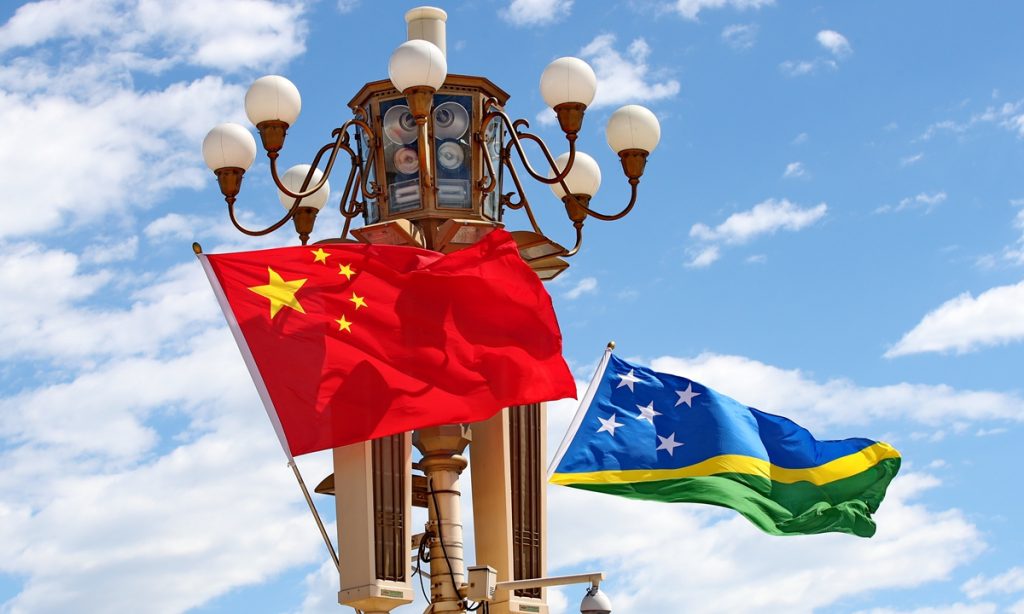'Concerns' for China's influence in Solomon Islands 'biased,' reflecting US strategic suppression: experts

Responding to "concerns" from a pro-US political figure in the Solomon Islands over China's growing influence ahead of the nation's elections, a Chinese Foreign Ministry spokesperson said on Monday that China adheres to non-interference principle in other countries' internal affairs, and advocates prioritizing development while respecting the Pacific nation's autonomy.
Experts noted that the "concerns" appear more like a slogan for the US with the aim of suppressing China's interests in the South Pacific region. Since establishing diplomatic relations, China's cooperation with and assistance to the Solomon Islands have been conducted under the principle of mutual respect without any political conditions, they stressed.
Daniel Suidani, a major rival of the incumbent Prime Minister Manasseh Sogavare and the former premier of the most populous island Malaita, said in a recent interview that China's presence in his nation is "alarming," noting that the upcoming elections could further "entrench Beijing's foothold."
One of the few provincial leaders in the country to refuse cooperation with China, Suidani claimed that he fears the assistance could one day "come with strings attached," while accusing China of meddling in the Solomon Islands' elections without providing evidence.
In response to the allegations, Chinese Foreign Ministry spokesperson Lin Jian said at Monday's press briefing that China has always adhered to the principle of non-interference in other countries' internal affairs and supports the people of the Solomon Islands in choosing a development path that suits their national conditions.
China advocates that all countries, in developing relations with Pacific island countries, should respect their autonomy, prioritize development, and promote inclusiveness, Lin noted.
"In fact, Suidani's province of Malaita and he himself has long had a close bond with the separatist authorities of Taiwan island. In addition, he is heavily influenced by the US, which has led to a bias against China," Chen Hong, executive director at the Asia Pacific Studies Centre of East China Normal University, told the Global Times on Monday.
According to media reports, Suidani has previously signaled willingness to re-establish ties with traditional security partners including Australia and the US.
Washington has been trying to manipulate the politics of the Solomon Islands since Sogavare took office, Chen noted, by pressuring the current government through various means such as media and public opinion, while at the same time cultivating individuals within opposition parties to influence the country's domestic and foreign affairs.
Another of Suidani's aims is to differentiate himself from the current government by emphasizing his stance on China, so as to enhance his political profile and gain support ahead of the election, observers said.
Voters from among 700,000 people spread over the more than 900 islands in the country will go to the polls on Wednesday to elect 50 lawmakers from 334 candidates. The 50 newly elected lawmakers then decide which of them will become prime minister.
Sogavare is seeking a second consecutive term, AP reported on Monday.
Western media, in line with US strategy, has spared no efforts to exploit this election as a chance to disrupt the relations between China and the Solomon Islands, claiming that the election could impact China's cooperation with the Pacific nation.
Shrugging off this hype, Chinese experts said that the tangible benefits China has brought to local people are clear, whether it's in infrastructure development or in comprehensive economic cooperation.
"Attempts by certain politicians to reject China's partnership ultimately goes against the interests and needs of its people, and are doomed to fail," Chen said.
Several previous cases have also proven that while some politicians may exploit anti-China rhetoric during their countries' elections, once in power, they quickly came to realize the benefits of cooperating with China and soon switch to a prudent and pragmatic approach in dealing with China, Chen noted.
Since severing ties with the island of Taiwan and establishing diplomatic relations with Beijing in 2019, the Solomon Islands has signed a security pact with China in 2022, and inked a comprehensive strategic partnership featuring mutual respect and common development for a new era in 2023 during Sogavare's visit to Beijing.